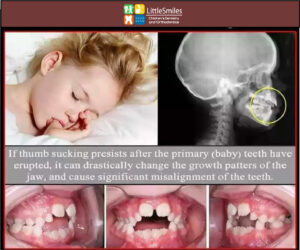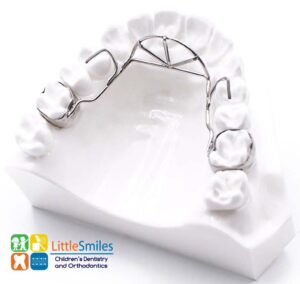Thumb sucking is a soothing, reflexive behavior, a natural reflex for infants and young children and most children stop on their own. It begins in the womb, before birth. Infants and babies often continue this relaxing practice after birth, which often helps to soothe them into sleep.

Effects of thumb sucking on your child’s teeth and mouth
Parents often worry about the effects of what thumb sucking will mean for your child. When a child continues sucking after they have teeth, it can lead to "crooked" teeth and bite problems ,affecting both baby teeth and permanent teeth.
Thumb sucking may cause problems with the proper growth of the mouth and alignment of the teeth, causing the upper front teeth to tip outward and the upper jaw to narrow in the back. The roof of the mouth can also see changes due to this behavior, that makes intervention necessary in some cases to ensure a child is still able to chew properly.
Although, some of this can be fixed with braces, it can also cause speech problems such as a lisp that may need to be corrected in therapy. Below you will find a few ways thumb sucking affects your child's teeth.
Ways thumb sucking can affect your child’s teeth
- Thumb sucking and the impact it will cause to a child’s alignment-When your child’s teeth grow in, it is normal for the upper teeth to overlap the lower teeth. However, a child’s thumb puts extra pressure on the gums and it can keep the teeth from erupting in the right position for a proper bite.
- How thumb sucking affects a child's bite- An open bite is a common problem when it comes to thumb-suckers. This is when the upper teeth do not cover the lower teeth when child is biting down. Another common problem is a posterior crossbite. This is caused by a narrow palate because of the pressure created by the habit. When a crossbite is present the outer part of the upper molars bite in the center of the lowers.
- Speech issues -Thumb sucking can cause speech issues. Lisp is another problem that children may encounter and find difficult to overcome.
- Tongue thrusting - When a child suck their thumb for an extended period of time, he/she can develop a secondary habit call tongue thrusting. The child move the tongue forward when swallowing and speaking. Even after stopping thumb sucking, a child will continue with this habit creating long term speech problems, swallowing difficulties and abnormal development of the jaw.
According to the American Dental Association, most children stop thumb-sucking somewhere between 2 and 4 years of age or by the time the permanent teeth are ready to erupt. At this time it could be to late.

Encouraging ways to approach your child to stop thumb sucking
- Use positive reinforcement: praise your child or provide a small reward such as, an extra bedtime story, a trip to the park or placing stickers on a calendar to record the days when your child successfully avoids thumb sucking.
- Offer gentle reminders
- Focus on praising your child when they are not thumb-sucking
- Children often suck their thumbs when feeling insecure or needing comfort. Focus on correcting the cause of the anxiety and provide comfort to your child.
- For an older child, involve him or her in choosing their method of stopping.
- Come up with creative ways to help your child understand that he is growing up and one day wont suck his thumb anymore.
If your concerned about the effect of thumb-sucking on your child's teeth. At little smiles we are here to help and answer any of your concerns.
What to do if nothing works?
Don't worry! For some children, thumb sucking is an incredibly difficult habit to break. Try not to worry, if putting too much pressure on your child to stop thumb sucking it could only delay the process.
In some occasions a appliance called habit breaker is necessary to stop a thumb or finger sucking habit. This is a passive appliance that is placed on the roof the mouth that blocks their fingers from being placed on the palate. Most of the time, a fix appliance (glue to the back molars) requires little maintenance. The habit breaker is placed for a minimum of 3 months. If you have any questions, please give us a call, and we can determine if a habit breaker is right for your child.

Parent’s time to get creative “bye-bye pacifier”
Did you know that, pacifiers can affect your child's teeth essentially the same way as sucking fingers and thumbs? The American Academy of Pediatric Dentistry (AAPD) recommends a pacifier over a thumb to comfort new babies since a pacifier is easier to break at an earlier age.
At little smiles, we believe frequent pacifier use over a longer period of time can affect the way a child’s teeth bite together and the growth of the jaw. The upper teeth may tip outward or become crooked and other changes in tooth position or jaw alignment could occur. The earlier a child can stop a sucking habit, the less chance there is that it will lead to orthodontic problems down the road.

What should you do if your child wont give up their pacifier?
We suggest our parent's find out what causes your child to cry out for their binky. Once you have identified which situations triggers your child's desire for a pacifier, be ready to replace it with comfort and reassurance. It can be helpful to swap out the pacifier with a transitional object such as a cuddly doll or stuffed toy. Additionally, distracting your child with a fun activity can help take their mind off the desired Binky. Be sure to offer positive reinforcement and praise when your child sleeps through the night or self-soothes without his or her pacifier.
Another idea is to take your child and pacifier to the store to pick out a new toy to replace their pacifier. There are many experienced store clerks who are used to this trick and are willing to play along when your child “trades in” the pacifier for a new toy of her choosing. We have spoken with other parents that have thrown a “Goodbye Binky” party, set out the pacifier for the Binky Fairy or donated the Binky to children who need it. Pretty creative!
Summary:
Positive approach and focus on praising your child when thumb sucking or weening off your child's binky (pacifier) is key to breaking habits. At little smiles we can assist in encouraging children to stop a sucking habit and discuss each child's particular situation. We can explain the effects on teeth to your child in an appropriate manner during your regular check-ups. This, along with support from parents and caregivers, helps many children quit their thumb-sucking or pacifier habits.
If you have any questions please feel free to call us or request an appointment online.






